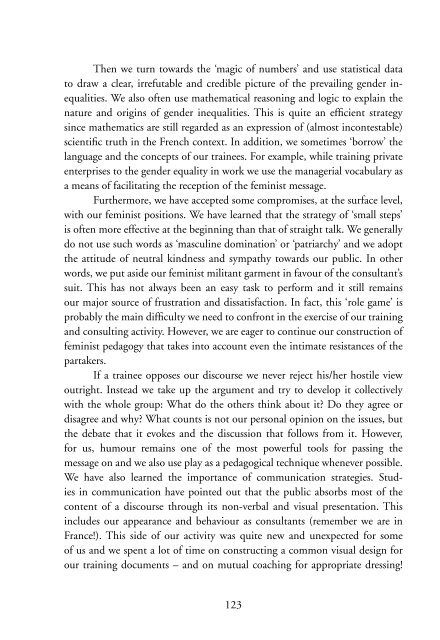Teaching with the third wave new feminists - MailChimp
Teaching with the third wave new feminists - MailChimp
Teaching with the third wave new feminists - MailChimp
You also want an ePaper? Increase the reach of your titles
YUMPU automatically turns print PDFs into web optimized ePapers that Google loves.
Then we turn towards <strong>the</strong> ‘magic of numbers’ and use statistical datato draw a clear, irrefutable and credible picture of <strong>the</strong> prevailing gender inequalities.We also often use ma<strong>the</strong>matical reasoning and logic to explain <strong>the</strong>nature and origins of gender inequalities. This is quite an efficient strategysince ma<strong>the</strong>matics are still regarded as an expression of (almost incontestable)scientific truth in <strong>the</strong> French context. In addition, we sometimes ‘borrow’ <strong>the</strong>language and <strong>the</strong> concepts of our trainees. For example, while training privateenterprises to <strong>the</strong> gender equality in work we use <strong>the</strong> managerial vocabulary asa means of facilitating <strong>the</strong> reception of <strong>the</strong> feminist message.Fur<strong>the</strong>rmore, we have accepted some compromises, at <strong>the</strong> surface level,<strong>with</strong> our feminist positions. We have learned that <strong>the</strong> strategy of ‘small steps’is often more effective at <strong>the</strong> beginning than that of straight talk. We generallydo not use such words as ‘masculine domination’ or ‘patriarchy’ and we adopt<strong>the</strong> attitude of neutral kindness and sympathy towards our public. In o<strong>the</strong>rwords, we put aside our feminist militant garment in favour of <strong>the</strong> consultant’ssuit. This has not always been an easy task to perform and it still remainsour major source of frustration and dissatisfaction. In fact, this ‘role game’ isprobably <strong>the</strong> main difficulty we need to confront in <strong>the</strong> exercise of our trainingand consulting activity. However, we are eager to continue our construction offeminist pedagogy that takes into account even <strong>the</strong> intimate resistances of <strong>the</strong>partakers.If a trainee opposes our discourse we never reject his/her hostile viewoutright. Instead we take up <strong>the</strong> argument and try to develop it collectively<strong>with</strong> <strong>the</strong> whole group: What do <strong>the</strong> o<strong>the</strong>rs think about it? Do <strong>the</strong>y agree ordisagree and why? What counts is not our personal opinion on <strong>the</strong> issues, but<strong>the</strong> debate that it evokes and <strong>the</strong> discussion that follows from it. However,for us, humour remains one of <strong>the</strong> most powerful tools for passing <strong>the</strong>message on and we also use play as a pedagogical technique whenever possible.We have also learned <strong>the</strong> importance of communication strategies. Studiesin communication have pointed out that <strong>the</strong> public absorbs most of <strong>the</strong>content of a discourse through its non-verbal and visual presentation. Thisincludes our appearance and behaviour as consultants (remember we are inFrance!). This side of our activity was quite <strong>new</strong> and unexpected for someof us and we spent a lot of time on constructing a common visual design forour training documents – and on mutual coaching for appropriate dressing!123
















